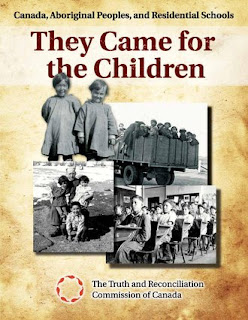We continue reading excerpts from Honouring the Truth, Reconciling for the Future Summary of the Final Report of the Truth and Reconciliation Commission of Canada and look at more Calls to Action for Language. This time the calls are aimed at Government Programs for Indigenous Languages and processes for Reclaiming Names. These are Calls to Action 14 - 17.
Government programs
At a time when government funding is most needed to protect Aboriginal languages and culture, Canada has not upheld commitments it previously made to fund such programs. In 2002, the federal government promised $160 million for the creation of a centre for Aboriginal languages and culture and a national language strategy. But, in 2006, the government retreated from that commitment, pledging instead to spend $5 million per year in “permanent funding” for the Aboriginal Languages Initiative (ali), which had been started in 1998. The ali is a program of government-administered heritage subsidies. It is not based on the notion of respectful nation-to-nation relations between Canada and Aboriginal peoples. Neither does it provide Aboriginal people with the opportunity to make decisions for themselves about how to allocate scarce resources and how to administer programs. Many who appeared before the Truth and Reconciliation Commission of Canada were skeptical about the government’s Truth & Reconciliation Commission commitment to preserve Aboriginal languages. As Michael Sillett told us, “I cannot see the federal government putting out the money that’s necessary for full restitution, you know.... I can’t bring back my language; I lost that. I lost my culture, you know”… The outcome of the consultation should be legislation and policies that affirm the importance of Canada’s Indigenous languages, and allocate adequate funding to ensure their preservation.
Calls to Action
14) We call upon the federal government to enact an Aboriginal Languages Act that incorporates the following principles:
i. Aboriginal languages are a fundamental and valued element of Canadian culture and society, and there is an urgency to preserve them.
ii. Aboriginal language rights are reinforced by the Treaties.
iii. The federal government has a responsibility to provide sufficient funds for Aboriginal-language revitalization and preservation.
iv. The preservation, revitalization, and strengthening of Aboriginal languages and cultures are best managed by Aboriginal people and communities.
v. Funding for Aboriginal language initiatives must reflect the diversity of Aboriginal languages.
In addition to promoting the use of Aboriginal languages, an Aboriginal Languages Commissioner would also educate non-Aboriginal Canadians about the richness and value of Aboriginal languages and how strengthening those languages can enhance Canada’s international reputation...
16) We call upon post-secondary institutions to create university and college degree and diploma programs in Aboriginal languages.
Reclaiming names
As a result of the residential school experienc
e, many Aboriginal people lost their
language and lost touch with their culture. Many also suffered a loss of a different
sort. It was common for residential school officials to give students new names. At the
Aklavik Anglican school in the Northwest Territories, a young Inuit girl named Masak
became “Alice”—she would not hear her old name until she returned home.96 At the
Qu’Appelle school in Saskatchewan, Ochankugahe (Path Maker) became Daniel
Kennedy, named for the biblical Daniel, and Adélard Standing Buffalo was named for
Adélard Langevin, the Archbishop of St. Boniface.97 Survivors and their families who
have sought to reclaim the names that were taken from them in residential schools
have found the process to be both expensive and time consuming. We believe that
measures should be put in place to reduce the burden placed on those who seek to
reclaim this significant portion of their heritage.
Call to Action
17) We call upon all levels of government to enable residential school Survivors and their families to reclaim names changed by the residential school system by waiving administrative costs for a period of five years for the name-change process and the revision of official identity documents, such as birth certificates, passports, driver’s licenses, health cards, status cards, and social insurance numbers.





